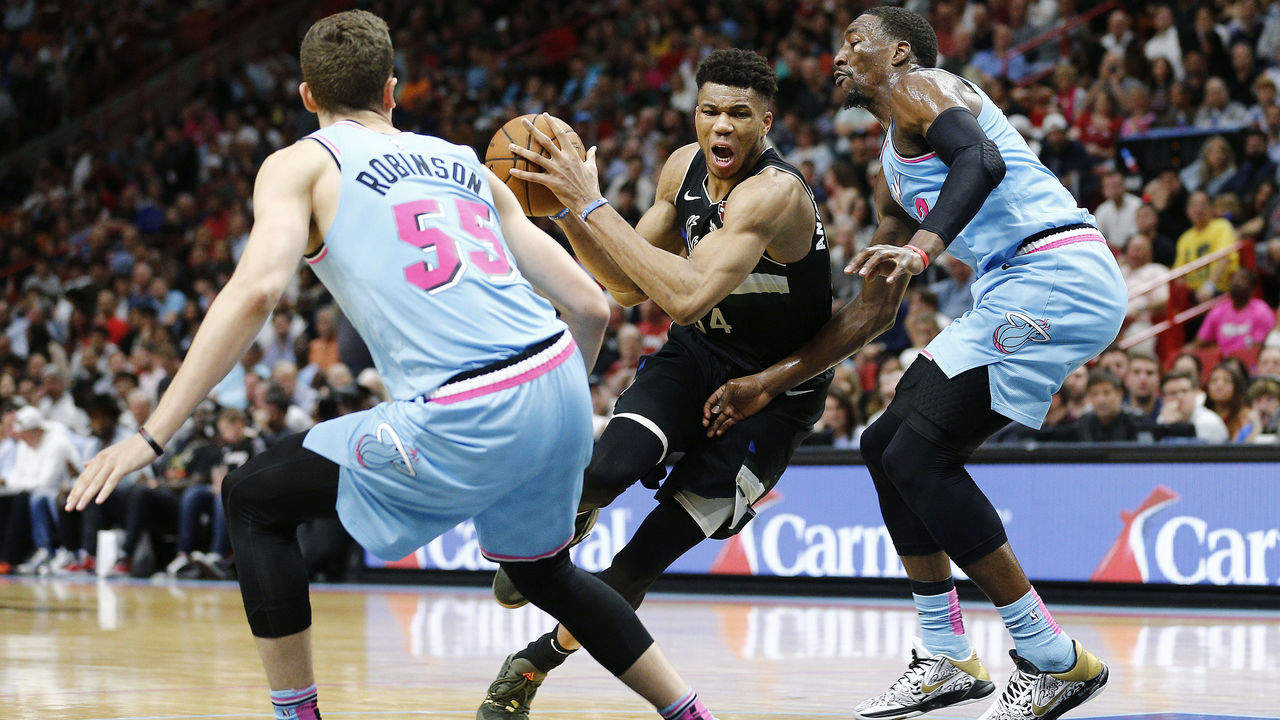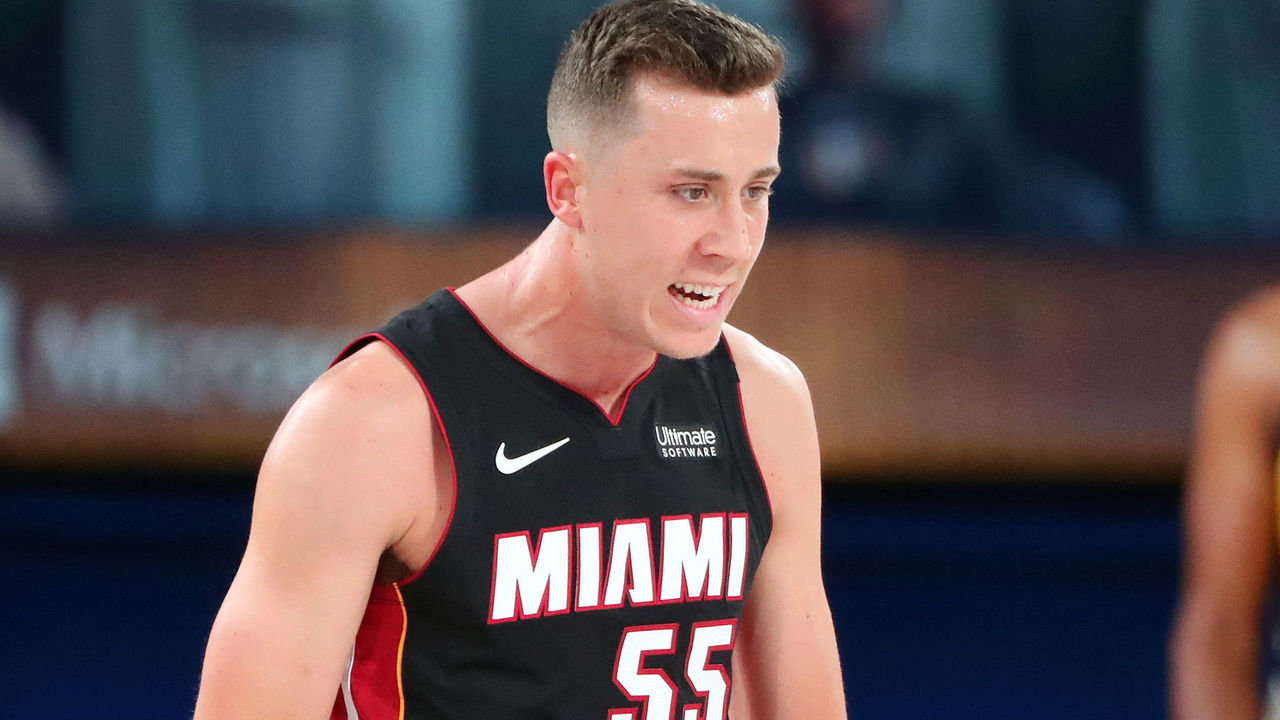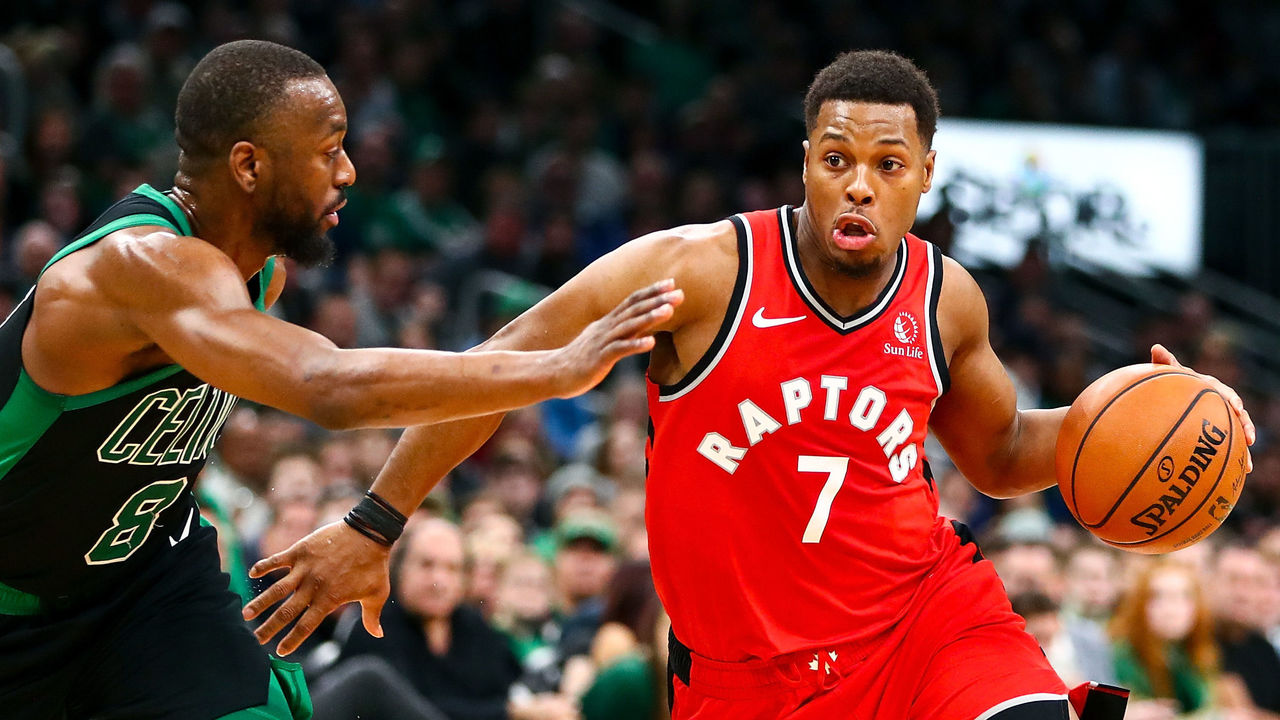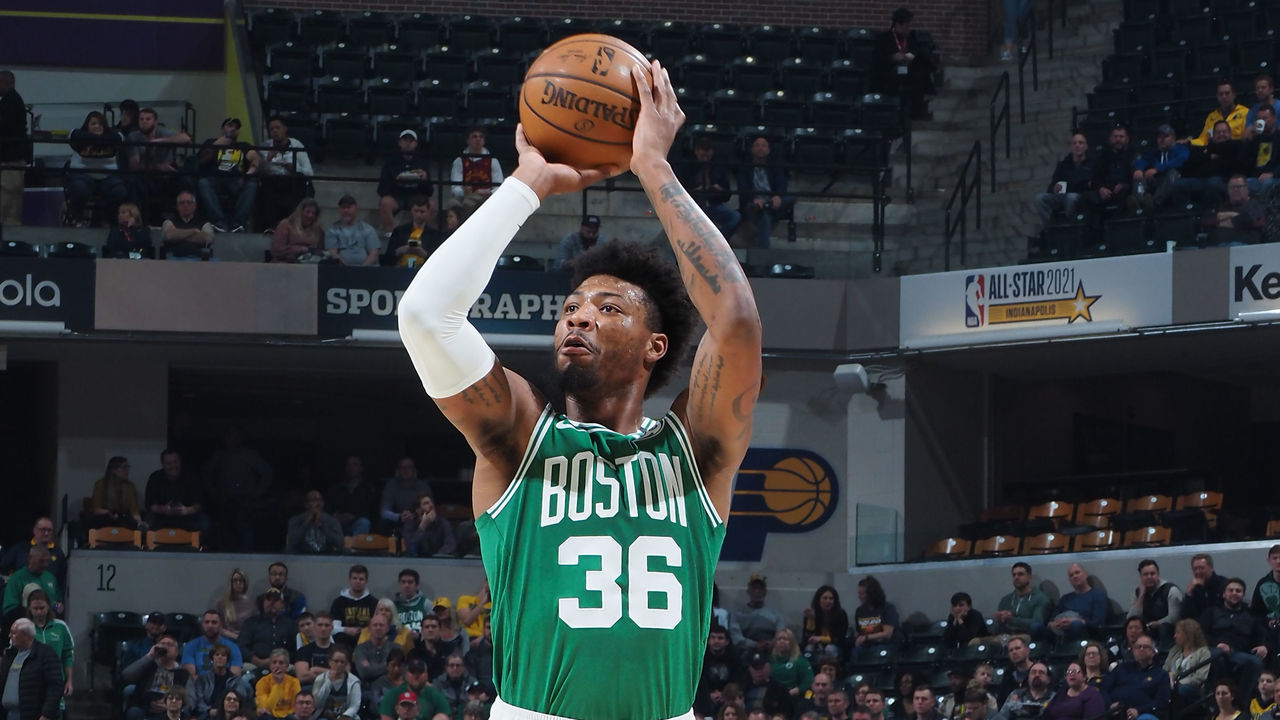Who ya got? Previewing the Eastern Conference 2nd round
The conference semifinals are almost set. Here, theScore's NBA feature writers Joseph Casciaro and Joe Wolfond preview and predict every second-round series. First up, the East:
No. 1 Bucks vs. No. 5 Heat

Prediction
Casciaro: Heat in 6
In a normal year, we could look at the Bucks' season-long dominance as a reminder not to fall for the small sample size trap their recent struggles have set. But this isn't a normal year, and it would feel strange to bet on Milwaukee based on the dominant team they were before the hiatus.
The Bucks may not have had much to play for - and in some instances, were missing Giannis Antetokounmpo - while they went 3-5 in seeding games and 4-9 over their final 13 games overall. However, a lack of stakes doesn't explain why they looked similarly sluggish for the majority of their first-round series win over an embarrassingly inferior Magic squad.
The most concerning is that The Greek Freak's supporting cast has struggled in ways strikingly similar to the way they did in previous postseason defeats.
Khris Middleton's handle is a legitimate issue against pressure defenses; Eric Bledsoe's jumper can't be counted on; Brook Lopez, for all of his defensive impact, hasn't recovered his shooting stroke since losing it in last year's playoffs. Some of the Bucks' depth pieces - like Donte DiVincenzo, who was impressive for the majority of the season - have seen their production fall off a cliff.
The Bucks already had reason to at least sweat Miami even at their best. Bam Adebayo is one of the best Giannis defenders in the league. The Heat's 3-point attack can punish Milwaukee's collapsing defense, as can Jimmy Butler's pull-up creation inside the arc. Erik Spoelstra will hunt advantages and mismatches on every single possession while adapting as needed. Mike Budenholzer has never been that kind of in-the-moment playoff coach. The Heat are also a deep, scrappy, physical team that will test opponents' mental fortitude as much as they'll test teams' physical toughness.
If they are to survive, the Bucks must be the team they were six months ago instead of the team they are now.
Wolfond: Bucks in 7
I agree the Bucks' play in the bubble has been uninspiring (unlike their off-court actions), and think the Heat can give them headaches for a couple of the reasons you mentioned.
Hitting threes, particularly from above the break, is how you bust Milwaukee's drop-and-chase scheme, and Miami was the NBA's most accurate above-the-break 3-point shooting team during the regular season. At the other end, Adebayo has the strength to absorb Antetokounmpo's force on the drive and the foot speed to hang with him on the perimeter, allowing the breakout big man to serve as either a first or last line of defense against Milwaukee's battering ram. But for all that, I can't quit the Bucks. They were so good for so much of the season, I have to believe that team is still in there somewhere. I'm prepared to go down with this ship.
I also just can't quite get there with the Heat, and think their matchup advantages are a tad overstated. For one, so much of that above-the-break prowess comes from Duncan Robinson, and I think with advanced scouting and prep time, Milwaukee can key in on him and mitigate the damage he can do, especially because he doesn't create his own shots off the dribble. Though they didn't show it in the regular-season series between these two teams, the Bucks generally do an excellent job of top-locking off-ball shooting threats while simultaneously sliding a helper toward the rim to guard against the back cuts those top-locks open up.
That's not going to work every time; Robinson will shake free and get his threes up, and his gravity will create gaps elsewhere. But if Milwaukee can turn him into something resembling a mere mortal, they should be fine conceding off-the-dribble threes to Goran Dragic and Tyler Herro and pick-and-pop looks to Kelly Olynyk.
And color me skeptical that Butler's pull-up game is going to be of any concern to Milwaukee. The dude shot 34.3% on pull-up mid-range jumpers during the regular season and went 2-of-9 on those shots in the first round against Indiana. Butler's offensive efficiency is propped up these days by a cavalcade of drives to the rim and trips to the free-throw line, and I don't know if he can sustain that efficiency against the foul-averse Bucks, who have the league's best rim-protecting tandem in Antetokounmpo and Lopez.
Also, defending Giannis is never a one-man job, and some of the guys the Heat will need in order to help slow him down - like Derrick Jones Jr. and Andre Iguodala - are non-shooters who will hurt Miami's spacing against Milwaukee's floor-shrinking defense.
I don't love the matchup for the Bucks, but I like it a little less for the Heat.
Series X-factor

Casciaro: Miami's shooting
Both of these teams are defensively designed to concede 3-point attempts (allowing the second- and third-highest 3-point attempt rates this season), and both finished top-seven in 3-point attempt rate on the offensive end. The difference is that the Heat combine volume and efficiency, finishing second overall in 3-point percentage (37.9%).
While Antetokounmpo is by far the best player in this series, the overall talent gap between these two teams is nowhere near as large as the 12-game gap the standings suggests. If the Heat win the math battle, the Bucks are in trouble.
During the three-game season series, which Miami won 2-1, the Heat only took two more 3-point attempts (127-125) than the Bucks, but they made 16 more (55-39). Bucks fans will have to cling to the hope that those numbers are merely small sample size theatre, because if the math plays out that way over the next couple weeks, a couple weeks is all that will be left of Milwaukee's season.
Wolfond: Miami's zone defense
The Heat played zone almost twice as frequently as any other team during the regular season, but they didn't use it at all in their first-round sweep of the Pacers. I'm really interested to see if they break it out in this series.
The Bucks didn't have much trouble when they faced zone coverage this season, but the logic behind zoning up against them is sound. Their half-court offense relies on dribble penetration, whether that leads to shots at the rim or kickouts to 3-point shooters. Their bigs (not counting Giannis, who initiates most of their possessions) serve almost exclusively as floor-spacers who open things up for his marauding rim-runs.
The zone is a pretty effective way of jamming up a drive-kick-swing machine. It can help the Heat both hide their weaker defenders like Robinson and Herro, and show Antetokounmpo multiple extra bodies while still keeping a big man stationed close to the basket. The Raptors sprinkled it in during last year's conference finals and held Milwaukee to 10 points on 24 possessions, according to Synergy.
The Heat like to use Derrick Jones Jr. at the top of the zone, which is a great option because he has the length to at least mildly annoy Giannis and the speed to rotate, recover, and close out to shooters. Butler can also stymie penetration from up top, either as a point man, a stunter to the nail, or a digger. And while the Bucks have a lot of willing shooters who can theoretically punish the zone, they actually rate out slightly below league average in terms of 3-point accuracy.
If Eric Bledsoe's jumper combusts like it did last postseason, using the 2-3 as a knuckleball becomes all the more viable.
No. 2 Raptors vs. No. 3 Celtics

Prediction
Wolfond: Raptors in 7
For all their zone looks, aggressive blitzes, box-and-ones, full-court presses, and frenetic rotations, the bedrock principle of the Raptors' defense is actually fairly simple: They hone in on someone or something their opponent's offense heavily relies on, and do everything in their power to take it away. They force opponents to scrap familiar sets, alter their typical shot profiles, and generally operate outside their comfort zone.
I think the biggest question I have about this matchup is how that approach holds up against a Celtics offense that is nearly as adaptable as the Raptors' defense, with playmaking and shooting at every position and myriad players capable of serving as the primary initiator. Short-circuiting Boston's offense is a lot more complicated than, say, forcing the ball away from Jayson Tatum.
With their plethora of ball-handlers, the Celtics are as good as any team at attacking from the second side, and they have the shooters to burn Toronto behind its zealous traps at the point of attack. They take great care of the basketball, and when they see a matchup they like, they can cook in isolation. The Raptors did an excellent job of limiting Tatum during the regular season, but still got alternately torched by Jaylen Brown and Kemba Walker.
The Gordon Hayward injury changes things, though. For a Celtics team without a ton of depth behind their top six, filling his vacated minutes on the wing will be far dicier than it was in their series against an uninspired 76ers team with one foot out the door. It means playing big minutes with a significantly lesser offensive threat on the floor, which will allow the Raptors more license to rove, help, and load up against Boston's other three high-end creators.
The Raptors have had their own issues scoring on Boston's swarming, switch-happy defense, but in Walker, they at least have a soft spot to attack. I'd expect Toronto to do its damnedest to drag him into the play by frequently using his man as a screener, especially for Pascal Siakam. Whether the Celtics opt to switch those actions or seek workarounds to switching, the Raptors can use that pressure point to unlock profitable openings.
Kyle Lowry's status looms, but the expectation is that he'll play most or all of the series. With Hayward out for its entirety, I have slightly more faith in Toronto's ability to defend Boston than vice versa.
Casciaro: Raptors in 6
Hayward's absence might prove monumental.
With both teams at full strength, this is as close to a seven-game toss-up as you could find. I still think this evenly matched series could be a barn burner, but Boston losing one of its many creators - which was their advantage - against Toronto's relentless defense gives a deeper Raptors team a greater edge.
I'm not sure the Raptors' defense, or any other team defense, for that matter, could contain all of Tatum, Walker, Brown, and Hayward.
The Raptors have a concerning sprained ankle of their own to worry about, but given that Lowry was day-to-day in the lead-up to what was supposed to be a Thursday opener, you'd have to assume the three extra days served him and the Raps well (even though the reason for the delay was obviously bigger than a basketball matchup).
Between Nick Nurse and Brad Stevens, this series should also be an X's and O's nerd's dream.
Series X-factor

Wolfond: Marcus Smart
Sorry to keep harping on Hayward's absence, but the biggest ripple effect is that it's bumped Smart into the starting lineup, and one of the most fascinating tactical components of the series will be how Toronto chooses to defend him.
Smart deserves credit for turning himself into basically a league-average 3-point shooter - he hit 34.7% on 6.6 attempts per game this year - but I still don't trust his jumper in high leverage, and my guess is the Raptors will help off of him liberally and dare him to punish them for it. If they do indeed go that route, they'll get to decide who they want their designated rover to be, and there are basically no bad choices. Lowry, with his uncanny knack for apparating into driving lanes, would be an obvious one; Siakam can also wreak plenty of havoc as a helper.
Another option would be to stash Gasol on Smart and put Siakam or OG Anunoby on Daniel Theis, which would allow the Raptors to switch any screening action involving the Celtics center and let Gasol camp out near the rim. The Celtics could respond to that by using Smart as a screener, and he screens quite well for a guard. This could turn into quite a game within the game. Smart could also just, you know, hit a bunch of threes, in which case he'll be one of the most valuable players in the series.
The reason Smart's offensive viability matters so much is that he's integral to what the Celtics do defensively. He's capable of guarding every Raptors regular, and odds are he'll see time on all of them. He has the ability to make the sledding extremely tough for any of Toronto's preferred initiators, from Lowry to Siakam to Fred VanVleet. A lot will hinge on how much (if any) of that defensive value he gives back at the other end.
Casciaro: Raptors' depth
I was going to piggyback off your Smart pick and go with Anunoby, whose improved offensive package has him more willing to attack mismatches in the post, which he might get the opportunity to do if the Celtics try to hide Kemba Walker on him. But I also don't think Stevens will allow that to continue for too long if Anunoby is abusing Walker.
Having said that, I do think that very conundrum is one of the many ripple effects of losing Hayward and needing to move Smart into the starting five. Once you get past Enes Kanter, the Celtics are hard-pressed to find dependable, playoff-rotation-caliber players, with all due respect to Brad Wanamaker, Semi Ojeleye, and Grant Williams.
I know depth matters less during the playoffs - when high-end talent regularly logs 40-plus minutes and generally exerts more force on the game - but in a series between two otherwise evenly matched, well-coached teams, without a clear-cut singular superstar that rises above the rest, a sizable depth advantage should still play a role in deciding the outcome.
If the Raptors' reserves simply play up to their capabilities, Toronto owns that sizable depth advantage.
HEADLINES
- Rays promote speedy prospect Simpson, who had 104 SB last year
- Cubs outlast D-Backs after wild 8th inning featuring 16 total runs
- Scherzer receives 2nd cortisone shot in sore thumb
- Report: Spurs' Popovich has medical incident in restaurant
- Yankees' Chisholm suspended 1 game, fined for tweeting after ejection